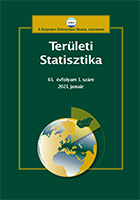A trianoni békeszerződés és a gazdasági konszolidáció hatása a magyar bankhálózatra
The impact of the Trianon Peace Treaty and economic consolidation on the Hungarian banking network
Author(s): Zoltán GálSubject(s): Social Sciences, Economy, Geography, Regional studies
Published by: Központi Statisztikai Hivatal
Keywords: financial institutions; banking network; Treaty of Trianon; Budapest; loss of wealth; urban network; banking market concentration; urban hierarchy
Summary/Abstract: The paper examines the impact of the Trianon Peace Treaty, which ended the First World War for Hungary, on the Hungarian banking system. It analyses the impact of border changes on the banking network and on urban development in Hungary between the two world wars. Cross-border changes caused significant losses of assets and capital for the banking system. The disconnection between branches and banking centres, separated by the new border, led to the freezing of assets and the accumulation of non-performing loans or many years. The author briefly reviews the difficulties of consolidating the disconnected banking network stranded outside the new border and the trends in the loss of space of Hungarian-owned financial institutions beyond the border. The paper also outlines the factors that determined the territorial transformation of regional banking centres in Hungary between the two world wars. The author concludes that the significant strengthening of the financial centre in Budapest and the decline of rural banking centres can be explained not only by the peace treaty but rather by the tendencies of market concentration that had begun earlier and can be analysed from the point of view of spatial economics.
Journal: Területi Statisztika
- Issue Year: 61/2021
- Issue No: 04
- Page Range: 407-444
- Page Count: 38
- Language: Hungarian

